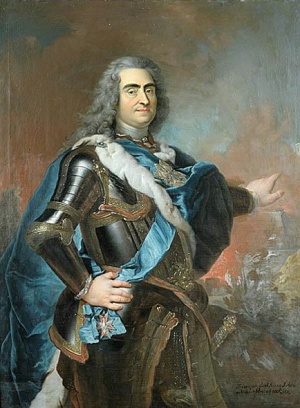Difference between revisions of "Augustus II, King of Poland (1670-1733)"
| [checked revision] | [checked revision] |
m (Text replace - "Karlsruhe; Schneider, 1913-1967: v. I" to "Karlsruhe: Schneider, 1913-1967: v. I") |
m |
||
| Line 1: | Line 1: | ||
| − | [[File:ME1_188.jpg|300px|thumb|right|''Augustus II, King of Poland | + | [[File:ME1_188.jpg|300px|thumb|right|''Augustus II, King of Poland<br /> |
| − | + | Source: [http://commons.wikimedia.org/wiki/Main_Page Wikipedia Commons]'']] | |
| − | Source: [http://commons.wikimedia.org/wiki/Main_Page Wikipedia Commons]'']] | + | Augustus II: King of [[Poland|Poland]] from 1697 to 1706, and 1709 to 1733, and Elector of [[Saxony|Saxony]] from 1694 to 1733; born 12 May 1670 in Dresden, the second son of Elector Johann Georg III of Saxony (1647-1691) and Anne Sophie of [[Denmark|Denmark ]](1647-1717). He became elector of Saxony in 1694 after the death of his older brother, Johann Georg IV (1668-1694), and ruled as Friedrich August (Frederick Augustus) I. After the death of King [[John III Sobieski, King of Poland (1629-1696)|John III Sobieski]] of Poland, Friedrich converted to Catholicism and, with the backing of Russia and Austria, was elected King of Poland in 1697. In 1706, [[Karl XII, King of Sweden (1682-1718)|King Karl XII of Sweden]] invaded Poland and forced Augustus to give up the throne in favor of Stanisław Leszczyński (1677-1766). However, Russia defeated Sweden in 1709 and Augustus regained the throne, ruling until his death on 1 February 1733 in Warsaw. He was succeeded by his son Friedrich August II, who ruled as [[Augustus III, King of Poland (1696-1763)|Augustus III]]. |
On 20 September 1697 at Kraców, Augustus II confirmed all the privileges previously granted to the Mennonites. He valued the Mennonites as good taxpayers and protected them when a storm of fanatical hostility on the part of some Polish leaders arose in Parliament in 1699 and 1700, demanding that the severe laws against [[Arians|Arians ]]be applied against them. These laws would have confiscated their goods and banished them. King Augustus defended them and had a new charter prepared for them in Warsaw, stating that "Mennonites retain all the rights, privileges and freedom in secular as well as in spiritual matters" (12 October 1732). | On 20 September 1697 at Kraców, Augustus II confirmed all the privileges previously granted to the Mennonites. He valued the Mennonites as good taxpayers and protected them when a storm of fanatical hostility on the part of some Polish leaders arose in Parliament in 1699 and 1700, demanding that the severe laws against [[Arians|Arians ]]be applied against them. These laws would have confiscated their goods and banished them. King Augustus defended them and had a new charter prepared for them in Warsaw, stating that "Mennonites retain all the rights, privileges and freedom in secular as well as in spiritual matters" (12 October 1732). | ||
| Line 9: | Line 9: | ||
Mannhardt, Wilhelm. <em>Die Wehrfreiheit der altpreussischen Mennoniten: eine geschichtliche Erörterung</em>. Marienburg: im Selbstverlage der Altpreussischen Mennonitengemeinden : in Commission bei B. Hermann Hemmpels Wwe., 1863: 98, 91. | Mannhardt, Wilhelm. <em>Die Wehrfreiheit der altpreussischen Mennoniten: eine geschichtliche Erörterung</em>. Marienburg: im Selbstverlage der Altpreussischen Mennonitengemeinden : in Commission bei B. Hermann Hemmpels Wwe., 1863: 98, 91. | ||
{{GAMEO_footer|hp=Vol. 1, p. 188|date=October 2007|a1_last=Neff|a1_first=Christian|a2_last=Thiessen|a2_first=Richard D.}} | {{GAMEO_footer|hp=Vol. 1, p. 188|date=October 2007|a1_last=Neff|a1_first=Christian|a2_last=Thiessen|a2_first=Richard D.}} | ||
| + | [[Category:Persons]] | ||
| + | [[Category:Rulers and Politicians]] | ||
Revision as of 07:53, 23 January 2014
Augustus II: King of Poland from 1697 to 1706, and 1709 to 1733, and Elector of Saxony from 1694 to 1733; born 12 May 1670 in Dresden, the second son of Elector Johann Georg III of Saxony (1647-1691) and Anne Sophie of Denmark (1647-1717). He became elector of Saxony in 1694 after the death of his older brother, Johann Georg IV (1668-1694), and ruled as Friedrich August (Frederick Augustus) I. After the death of King John III Sobieski of Poland, Friedrich converted to Catholicism and, with the backing of Russia and Austria, was elected King of Poland in 1697. In 1706, King Karl XII of Sweden invaded Poland and forced Augustus to give up the throne in favor of Stanisław Leszczyński (1677-1766). However, Russia defeated Sweden in 1709 and Augustus regained the throne, ruling until his death on 1 February 1733 in Warsaw. He was succeeded by his son Friedrich August II, who ruled as Augustus III.
On 20 September 1697 at Kraców, Augustus II confirmed all the privileges previously granted to the Mennonites. He valued the Mennonites as good taxpayers and protected them when a storm of fanatical hostility on the part of some Polish leaders arose in Parliament in 1699 and 1700, demanding that the severe laws against Arians be applied against them. These laws would have confiscated their goods and banished them. King Augustus defended them and had a new charter prepared for them in Warsaw, stating that "Mennonites retain all the rights, privileges and freedom in secular as well as in spiritual matters" (12 October 1732).
Bibliography
Hege, Christian and Christian Neff. Mennonitisches Lexikon, 4 vols. Frankfurt & Weierhof: Hege; Karlsruhe: Schneider, 1913-1967: v. I, 96.
Mannhardt, Wilhelm. Die Wehrfreiheit der altpreussischen Mennoniten: eine geschichtliche Erörterung. Marienburg: im Selbstverlage der Altpreussischen Mennonitengemeinden : in Commission bei B. Hermann Hemmpels Wwe., 1863: 98, 91.
| Author(s) | Christian Neff |
|---|---|
| Richard D. Thiessen | |
| Date Published | October 2007 |
Cite This Article
MLA style
Neff, Christian and Richard D. Thiessen. "Augustus II, King of Poland (1670-1733)." Global Anabaptist Mennonite Encyclopedia Online. October 2007. Web. 23 Apr 2024. https://gameo.org/index.php?title=Augustus_II,_King_of_Poland_(1670-1733)&oldid=111658.
APA style
Neff, Christian and Richard D. Thiessen. (October 2007). Augustus II, King of Poland (1670-1733). Global Anabaptist Mennonite Encyclopedia Online. Retrieved 23 April 2024, from https://gameo.org/index.php?title=Augustus_II,_King_of_Poland_(1670-1733)&oldid=111658.
Adapted by permission of Herald Press, Harrisonburg, Virginia, from Mennonite Encyclopedia, Vol. 1, p. 188. All rights reserved.
©1996-2024 by the Global Anabaptist Mennonite Encyclopedia Online. All rights reserved.

